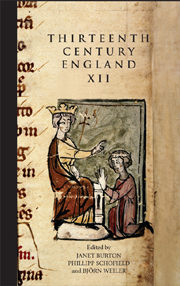Book contents
- Frontmatter
- Contents
- PREFACE
- LIST OF CONTRIBUTORS
- LIST OF ABBREVIATIONS
- The English and the Welsh in Fouke le Fitz Waryn
- Royal Piety in Thirteenth-century Scotland: The Religion and Religiosity of Alexander II (1214–49) and Alexander III (1249–86)
- The 1213 Pipe Roll and Exchequer Authority at the End of John's Reign
- The Public Debate during the Baronial Rebellion
- Richard of Cornwall and the Baronial Opposition in 1263
- Les liens personnels entre les cours de France et d'Angleterre sous le règne de Philippe III, 1270–85
- The Lay Opposition to Edward I in 1297: Its Composition and Character
- Peacekeepers and Lawbreakers in London, 1276–1321
- ‘The peace less kept’? The Origins, Revelations and Impact of Edward I's ‘Trailbaston’ Commissions of 1305–7
- Notes and Documents
The Public Debate during the Baronial Rebellion
Published online by Cambridge University Press: 12 September 2012
- Frontmatter
- Contents
- PREFACE
- LIST OF CONTRIBUTORS
- LIST OF ABBREVIATIONS
- The English and the Welsh in Fouke le Fitz Waryn
- Royal Piety in Thirteenth-century Scotland: The Religion and Religiosity of Alexander II (1214–49) and Alexander III (1249–86)
- The 1213 Pipe Roll and Exchequer Authority at the End of John's Reign
- The Public Debate during the Baronial Rebellion
- Richard of Cornwall and the Baronial Opposition in 1263
- Les liens personnels entre les cours de France et d'Angleterre sous le règne de Philippe III, 1270–85
- The Lay Opposition to Edward I in 1297: Its Composition and Character
- Peacekeepers and Lawbreakers in London, 1276–1321
- ‘The peace less kept’? The Origins, Revelations and Impact of Edward I's ‘Trailbaston’ Commissions of 1305–7
- Notes and Documents
Summary
Introduction
Research into public debate does not loom large in medieval studies. In fact, the term ‘public debate’ is often seen as an anachronistic imposition of a phenomenon only emerging in the early modern period. From one side, this reluctance to deal with public debate – and the related concepts of ‘public sphere’ and ‘public opinion’ – is not difficult to understand, since the work that established the point of departure for public sphere studies to a large extent neglected the Middle Ages. The work in question is Jürgen Habermas' Strukturwandel der Öffentlichkeit, originally published in 1962. According to Habermas, the medieval public sphere – or the ‘representative public sphere’ as he calls it – was politically dysfunctional because it did not constitute an arena for discussion and argument, but rather represented a forum in which courtly society could display its power. Consequently, it was not debate and the ‘force of the argument’ that set the premise for the medieval ‘representative public sphere’, but symbolic communication in the form of rituals, gestures and rhetoric.
Now, this is obviously neither the time nor the place for dealing in detail with Habermas' theoretical construction of the ‘bourgeois public sphere’. However, because it is the basis for recent scholarship on public debate as well as one main reason for the neglect of medieval scholars in looking for medieval variants of public debate, some further aspects of the Strukturwandel need to be addressed.
- Type
- Chapter
- Information
- Thirteenth Century England XIIProceedings of the Gregynog Conference, 2007, pp. 45 - 60Publisher: Boydell & BrewerPrint publication year: 2009



